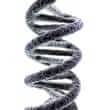Background
- Ribose has many important roles in physiology. Ribose and its related compound deoxyribose are the building blocks of the nucleic acids ribonucleic acid (RNA) and deoxyribonucleic acid (DNA), respectively. Ribose phosphates are used by microorganisms to make the amino acid histidine, one of the 22 amino acids commonly found in animal proteins. Ribose is the sugar that begins the metabolic process for production of adenosine triphosphate (ATP), the major source of energy used by cells.
- Use of ribose by athletes and bodybuilders is based on the theory that ribose supplies muscle cells with a continuous supply of ATP. It is also sometimes combined with creatine, another substance that helps keep the muscles supplied with ATP, in formulations marketed to professional bodybuilders. While there is an abundance of anecdotal evidence from bodybuilders and other athletes concerning the positive effects of ribose, clinical research in this area suggests that ribose may not have effects on exercise performance.
- Research has shown that ribose may help speed recovery of the heart muscle after a heart attack and improve blood flow to the heart in those affected by inadequate oxygen. Ribose supplementation has been used to support heart function and rejuvenate heart tissue after both heart attacks and heart surgery. Research has also shown that ribose may improve symptoms associated with fibromyalgia (muscle and connective tissue pain). However, research is preliminary, and firm conclusions cannot be drawn at this time.
References
- Ataka S, Tanaka M, Nozaki S, et al. Effects of oral administration of caffeine and D-ribose on mental fatigue. Nutrition 2008;24(3):233-238. View Abstract
- Dunne L, Worley S, Macknin M. Ribose versus dextrose supplementation, association with rowing performance: a double-blind study. Clin J Sport Med 2006;16(1):68-71. View Abstract
- Gebhart B, Jorgenson JA. Benefit of ribose in a patient with fibromyalgia. Pharmacotherapy 2004;24(11):1646-1648. View Abstract
- Gilula MF. Cranial electrotherapy stimulation and fibromyalgia. Expert Rev Med Devices 2007;4(4):489-495. View Abstract
- Hellsten Y, Skadhauge L, Bangsbo J. Effect of ribose supplementation on resynthesis of adenine nucleotides after intense intermittent training in humans. Am J Physiol Regul Integr Comp Physiol 2004;286(1):R182-R188. View Abstract
- Hjiej H, Doyen C, Couprie C, et al. [Substitutive and dietetic approaches in childhood autistic disorder: interests and limits]. Encephale 2008;34(5):496-503. View Abstract
- Kendler BS. Supplemental conditionally essential nutrients in cardiovascular disease therapy. J Cardiovasc Nurs 2006;21(1):9-16. View Abstract
- Kerksick C, Rasmussen C, Bowden R, et al. Effects of ribose supplementation prior to and during intense exercise on anaerobic capacity and metabolic markers. Int J Sport Nutr Exerc Metab 2005;15(6):653-664. View Abstract
- MacCarter D, Vijay N, Washam M, et al. D-ribose aids advanced ischemic heart failure patients. Int J Cardiol 2009;137(1):79-80. View Abstract
- Quinlivan RM, Beynon RJ. Pharmacological and nutritional treatment trials in McArdle disease. Acta Myol 2007;26(1):58-60. View Abstract
- Sawada SG, Lewis S, Kovacs R, et al. Evaluation of the anti-ischemic effects of D-ribose during dobutamine stress echocardiography: a pilot study. Cardiovasc Ultrasound 2009;7:5View Abstract
- Shecterle L, Kasubick R, St. Cyr J. D-ribose benefits restless legs syndrome. J Altern.Complement Med 2008;14(9):1165-1166. View Abstract
- Steele IC, Patterson VH, Nicholls DP. A double blind, placebo controlled, crossover trial of D-ribose in McArdle's disease. J Neurol Sci 1996;136(1-2):174-177. View Abstract
- Teitelbaum JE, Johnson C, St Cyr J. The use of D-ribose in chronic fatigue syndrome and fibromyalgia: a pilot study. J Altern Complement Med 2006;12(9):857-862. View Abstract
- Wagner S, Herrick J, Shecterle LM, et al. D-ribose, a metabolic substrate for congestive heart failure. Prog Cardiovasc Nurs 2009;24(2):59-60. View Abstract







